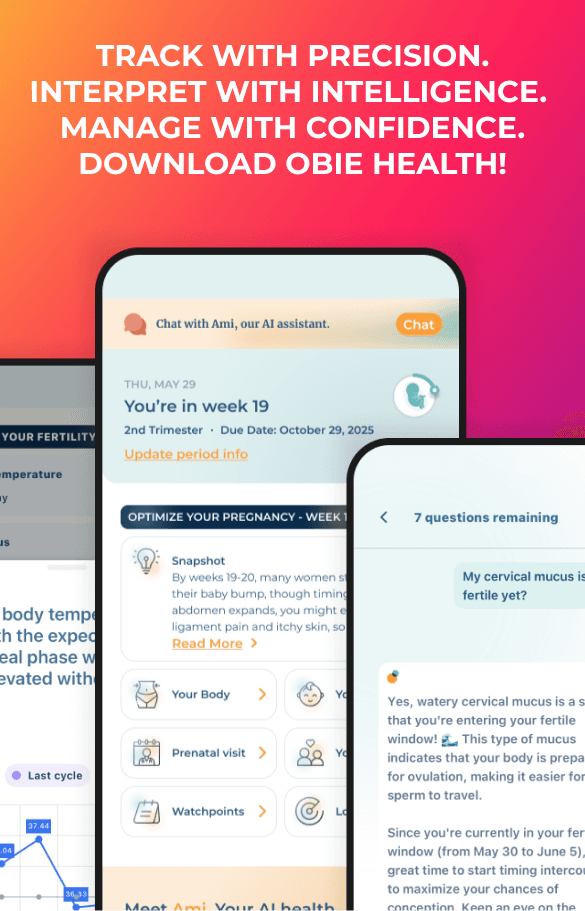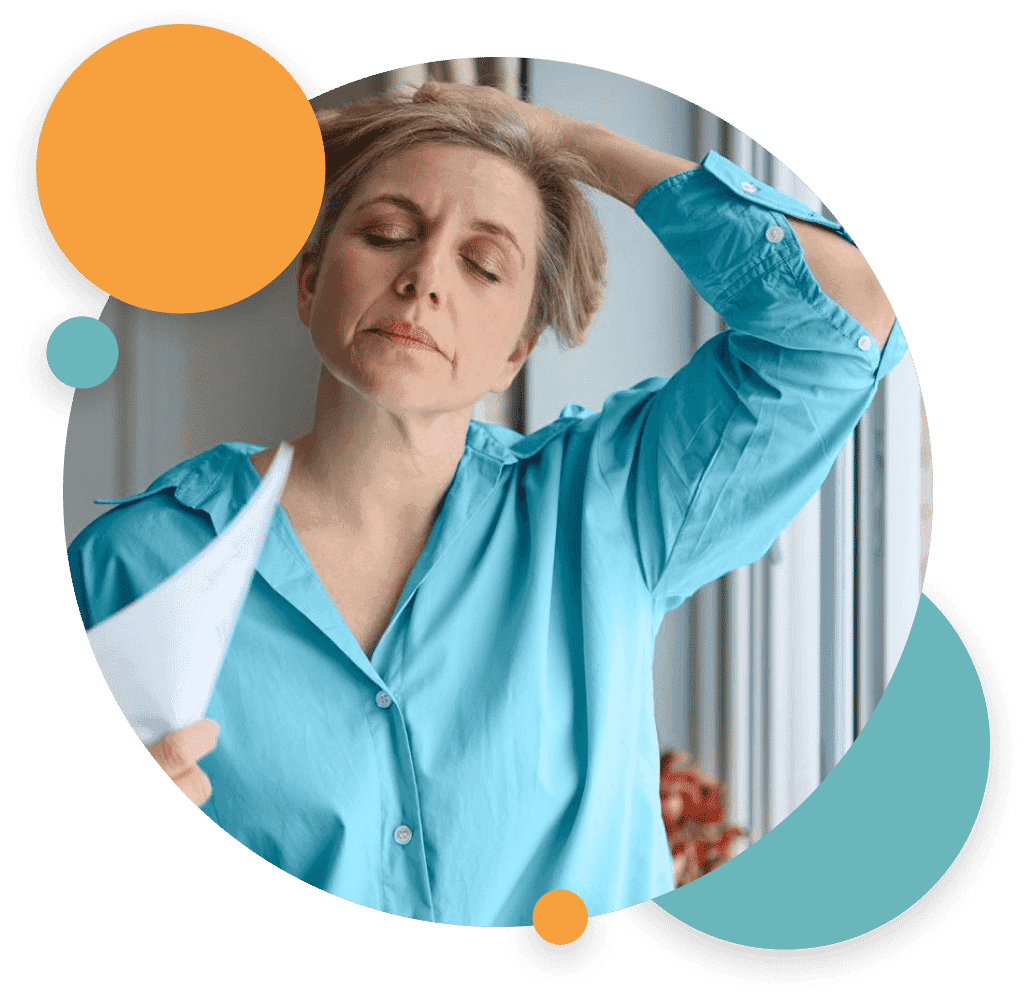Overview of Common Menopause Symptoms
Menopause
Obie Editorial Team

As women reach the age of 40, many begin thinking about menopause and how it will feel to move into a time of life when reproduction is no longer an option. For some, menopause is like a rebirth with freedom from periods, cramps, and birth control options. Others fear menopause symptoms will change their life for the worse. Often the most troublesome part of menopause is the onslaught of symptoms, which often seem to pop up out of the blue. Here are the more common menopause symptoms.
Most common menopause symptoms
- Irregular periods: Most women find irregular periods to be one of the first signs they are in perimenopause. Irregularity in your period can include spotting, heavy bleeding, dark blood, long and short cycles, and missed cycles. Once you have gone 12 months without a period, you have officially reached menopause (Yay?).
- Vaginal dryness: Low levels of estrogen decrease blood supply to the vagina, which can lead to vaginal dryness and atrophy. Intercourse can be painful without lubrication, so find a good lubricant to help decrease discomfort.
- Hot flashes: Introducing the most common and well-known symptom of perimenopause. The cause of hot flashes is unknown, but it is likely related to several hormonal factors that affect the hypothalamus in your brain, which is your body’s thermostat. An instant increase in body temperature leaves a woman feeling like her internal temperature has skyrocketed.
- Night sweats: Waking in the middle of the night, sweating profusely. These are hot flashes that you experience while you sleep. Many babes find that they lose precious sleep due to night sweats.
- Loss of sex drive/libido: Due to a decrease in sex hormones (primarily estrogen and testosterone), many women experience low sex drive during perimenopause. You can try to boost your sex drive with lifestyle changes such as increasing intimacy with your partner, using lubrication, and exercising.
Mood swings
From happy to sad to depressed, moods can vary hourly, daily, or weekly.
Fatigue
Lack of sleep from night sweats can lead to a lack of energy during the day.
Thinning hair or hair loss
Hair follicles require estrogen to grow.
Sleeplessness or insomnia
Hot flashes, night sweats, and hormone levels make sleeping difficult.
Disorientation and memory lapse
Often associated with lack of sleep and estrogen deficiency.
Loss of balance
May be associated with fatigue, stress, and estrogen levels.
Weight gain
Slowing metabolism and low estrogen can lead to fat redistribution and storing.
Incontinence
Surgery, childbirth, and age are associated with this common menopause symptom.
Bloating
Another symptom associated with age, some doctors link bloating to lactose intolerance or diets high in sodium and low in potassium.
Body odor
Associated with increased sweating due to hot flashes and night sweats.
Rapid heartbeat
Typically occurring during perimenopause.
Depression
Estrogen is linked to serotonin levels. So less estrogen could mean less serotonin leading to depression.
Anxiety, irritability, and panic
These all fall into the mood swing category and are often associated with hormonal changes.
Headaches
Lack of estrogen can lead to menopause migraines. HRT should stop the pain.
Joint pain
Linked to fluctuating hormone levels in the body.
Electric sensation in the head or on skin
Thought to be linked to estrogen levels, pain, or electric sensation can feel like a rubber band snap. Some women suffer this symptom before a hot flash.
Symptoms that affect mental health
Thanks again to a decrease in estrogen, your mental health can be all over the map during perimenopause. Estrogen helps regulate several neurohormones which help with mood stabilization. These neurohormones include serotonin, norepinephrine, and dopamine.
- Mood swings: With neurohormones being affected by fluctuating estrogen levels in perimenopause, it is no surprise that some women go through many ups and downs, even throughout the day. Aerobic exercise, getting enough sleep, eating healthy foods, and letting go of stress can help stabilize your mood.
- Brain fog: Estrogen helps support cognitive functioning as well. The decrease in estrogen during perimenopause can cause some women to feel forgetful or to have a “fuzzy brain.”
- Panic disorders/attacks: Fluctuating hormone levels can cause feelings of panic and anxiety. However, severe and/or frequent panic attacks are not normal symptoms of perimenopause and should be evaluated by your doctor.
- Anxiety: Feelings of anxiety can develop during perimenopause, and you are more likely to have anxiety if you have a history of anxiety. However, like panic attacks, it is not a normal symptom of perimenopause to have severe and/or ongoing anxiety. Therefore, you will want to meet with your doctor to evaluate your anxiety.
- Irritability: When you look at all the symptoms of menopause, it is no wonder women feel irritable! Between the various symptoms of perimenopause, lack of sleep, and hormonal changes, irritability can be a part of this transition.
- Depression: Having a history of depression (such as postpartum depression) increases your risk of having depression in perimenopause. If you are feeling depressed it is important to talk with your doctor to find a treatment that will work for you.
- Difficulty concentrating: Again, thanks hormones! Many of your cognitive functions can be affected, including attention span and attention to detail.
Symptoms that affect physical health
- Hair loss: Estrogen and progesterone help hair grow and stay on your head for a longer period of time. Many women find their hair becomes thinner during menopause.
- Unexplained dizziness: Episodes of dizziness can sometimes be related to anxiety, fatigue, or hot flashes. However, dizziness is also associated with medical conditions such as high blood pressure, so talk with your doctor if you are experiencing frequent and/or severe episodes of dizziness.
- Fatigue: Many women experience fatigue due to fluctuating hormones. Lack of sleep due to sleep problems in perimenopause certainly doesn’t help!
- Sleep problems: Aggravating perimenopause symptoms, such as night sweats and anxiety can cause sleep problems, which also increases fatigue.
- Bloating: During perimenopause, you can experience increases in estrogen levels, which can lead to bloating. Fortunately, bloating typically decreases significantly once a woman reaches menopause.
- Weight gain: Many women experience an increase in weight gain and particularly notice an increase in belly fat.
- Stress incontinence: This is typically due to weak pelvic floor muscles which can be partly due to aging, childbirth, and a decrease in muscle mass. Most women experience urine leakage with laughing, sneezing, coughing, or lifting.
- Brittle nails: A decrease in estrogen can lead to a decrease in collagen, elastin, and keratin, which can affect your overall nail and skin health.
- Osteoporosis: Many women experience osteoporosis due to aging, a decrease in estrogen, and loss of muscle mass. Eating high protein meals, staying fit, taking supplements to support bone health (for example Calcium and Vitamin D), and weight-bearing exercise can reduce your risk for osteoporosis.
- Irregular heartbeat: The perimenopausal period can be marked with some changes in your heart function. Many women experience non-threatening heart arrhythmias and an increase in heart rate and palpitations.
- Allergies: Many babes will notice they develop allergies to certain things in their environment or diet when they start perimenopause. Keep a journal of things you eat or come into contact with to identify triggers.
- Changes in body odor: Some women find they develop a different (and sometimes not-so-pleasant body odor in perimenopause. A combination of hormonal changes and increased sweating with hot flashes can cause changes in body odor.
Painful menopause symptoms
- Headaches and migraines: Once again, fluctuation in estrogen is typically the cause of headaches and migraines in perimenopause. The good news is that many women report their headaches improve in menopause when estrogen levels decline and even out.
- Breast pain: Tender breasts are a direct result of fluctuations in estrogen that cause tenderness in your breast tissue. Typically, breast pain resolves once you reach menopause, but if you are worried or notice any abnormal changes to your breast tissue, consult your doctor right away.
- Joint pain: The evidence is unclear whether or not joint pain is due to perimenopause or the aging process. Nonetheless, many women notice their joints become sore and tender starting in perimenopause.
- Burning mouth: Burning mouth syndrome (BMS) is partly caused by the decrease in circulating estrogen, which in turn reduces saliva production and creates a metallic taste in the mouth. Hormonal changes are just one cause of BMS so consult your doctor if this symptom is affecting your quality of life.
- Electric shocks: Some women experience an unpredictable shock sensation that frequently signals the start of a hot flash. The cause of this painful sensation? You already guessed it: hormones.
- Gum problems: Perimenopausal women are at greater risk for bone loss with the decrease in estrogen. Bone loss in your teeth can lead to receding gums and tooth decay.
- Digestive problems: Unfortunately, your digestive system is not excluded from this list. Women report symptoms ranging from nausea, vomiting, diarrhea, stomach cramping, and constipation in perimenopause. Yay…..
- Dry and itchy skin: Perimenopause sucks away moisture from your tissues and skin (remember that lovely vaginal dryness you may be experiencing?) The same effect is occurring in your skin.
- Tingling extremities: Paresthesia is the official term for unexplained tingling in your arms and legs. Fortunately, it usually goes away once you reach menopause.
- Muscle tension: Estrogen serves as a regulator of muscle cell energy. Therefore, with low estrogen levels, your muscles tire and tense more easily due to a heightened presence of cortisol (a stress hormone).
Some women suffer from a few of these symptoms and others suffer from many. A gynecologist can help work through the most severe symptoms and offer treatment options.
Read More










